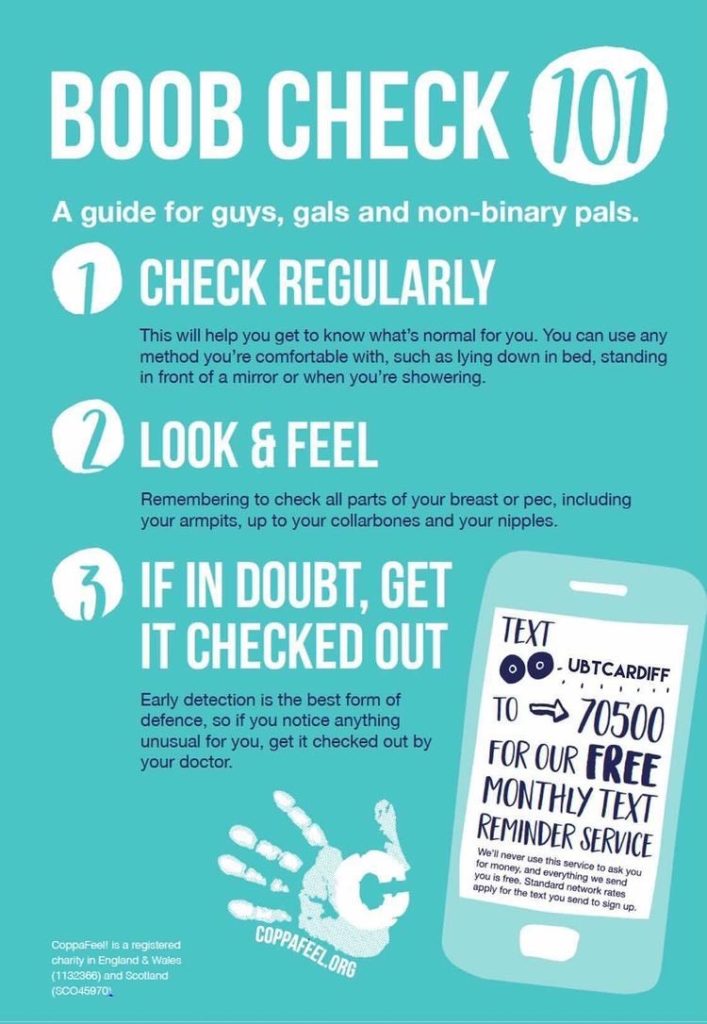
International Women’s Day: We spoke to the Cardiff Uni Boob Team about checking your chests
13% of women do this once a year or less
This International Women’s Day, we wanted to share some guidance on how and why you should be checking your breasts, chest and pecs regularly (because Breast cancer isn’t just for women). Lots of us women are faced with so many pressures that we constantly need to keep under control, like periods, birth control, babies – the list goes on. But one thing that we all definitely need to do, but rarely bother with, is to check our boobs regularly to make sure everything is okay.
The Cardiff Tab spoke to the Uni Boob Team Cardiff, the representatives of Coppafeel at Cardiff University, to help put together this guide to checking your boobs/chests properly: what to do, how often, and how to spot any signs which may be linked to breast cancer.
Why should you check your breasts and chest?
According to a YouGov survey, 1 in 10 women have never checked their breasts, whilst 19% of women check them every 6 months or less, and 13% do it once a year or less. This means that we are at risk of missing a sign of something sinister if we don’t regularly check them and make sure we know our boobs inside and out.
The Uni Boob Team said that “we recommend checking your boobs/pecs/chest once a month”. To help make life a bit easier, they said they “have a handy text sign up that is if you text UBTCARDIFF 70500, you’ll get free monthly reminders to check your chest!”

How do I know if there are any changes?
To be able to spot any changes, big or small, you need to know what your boobs are like normally. This includes knowing how they naturally vary throughout your menstrual cycle, if you have one.
The NHS Breast Screening Programme has produced a 5-point plan in order for women to become breast aware:
- Know what is normal for you
- Look at your breasts and feel them
- Know what changes you need to look for
- Report any changes as soon as you see them, no matter how big or small
- Attend a routine screening if you are aged 50 or over
The best way to examine your boobs is to look at them and feel each breast and armpit up to your collarbone. Some people may find this easiest to do in the shower or bath as you are washing.
Uni Boob Team said: “it’s important to check wherever you feel most comfortable might be in the shower or when you’re laying in bed”.
They added, “it’s all about getting to know what’s normal for you, then if you notice something that doesn’t seem or feel quite right for you monitor it for a week and if it’s not improved go to your GP.”

What changes do I need to look for?
If you notice any of the following, then the best option is to see your GP and address the changes with them:
- A change in the size, outline, or shape of your breast
- A change in the look or feel of your skin; for example, puckering or dimpling
- A new lump, thickening or bumpy area in one breast or armpit that is different from the same area on the other side
- Nipple discharge that is not milky
- Bleeding from your nipple
- A moist, red area on your nipple that doesn’t heal easily
- Any change in nipple position, such as your nipple being pulled in or pointing differently
- A rash on or around your nipple
- Any discomfort or pain in one breast, particularly if it’s a new pain and doesn’t go away (pain, however, is only a symptom of breast cancer is rare cases)

When do I need to see my GP?
The NHS say to always see your GP if you are concerned. 9 out of 10 lumps are not cancerous but, if you are worried for any reason, it is always best to see your GP as soon as possible. This is important because it means breast cancer can be ruled out or detected ASAP.
Unfortunately due to the pandemic, nearly half of people who have potential cancer symptoms in the first wave of the pandemic did not contact their GP, a study from Cardiff University and Cancer Research has found.
Principal investigator Professor Kate Brain, a health psychologist from Cardiff University’s School of Medicine, said people had “put their health concerns on hold to protect the NHS”. At a time when our health matters more than ever, it is so important to get any lump or bump checked out as soon as you can so that you can get the right treatment should you need it.
According to Cancer Research UK, they found that 76% of women have survived breast cancer for 10 years or more (between 2013 and 2017) but also found that 1 in 4 cases of breast cancer are preventable, at 23% (2015).
The Uni Boob Team Cardiff said: “GPs are still open during COVID and want to help, so if in doubt get checked out!”
Is it only women who need to check?
The UBTC wanted to emphasise how important it is to get checked out and to check yourself too. They said: “It’s important to check yourself as young people unfortunately can get breast cancer too, so catching anything early is always best!”
There is a common misconception that breast cancer only effects women, but a spokesperson for UBTC told The Cardiff Tab: “400 men a year get breast cancer so men should be checking too!”
It is so important to check yourself regularly, to look after yourself and make sure you can get the best treatment should you catch the signs early. So, regardless of gender, do yourself a favour this International Women’s Day and get to know your breasts and chests.
Recommended stories by this writer:
• Christmas cards and lonely hearts: Small acts of kindness by Cardiff students over the pandemic
• A guide to your ultimate lockdown Galentines
• Cardiff SU are giving out free products for all who menstruate









































